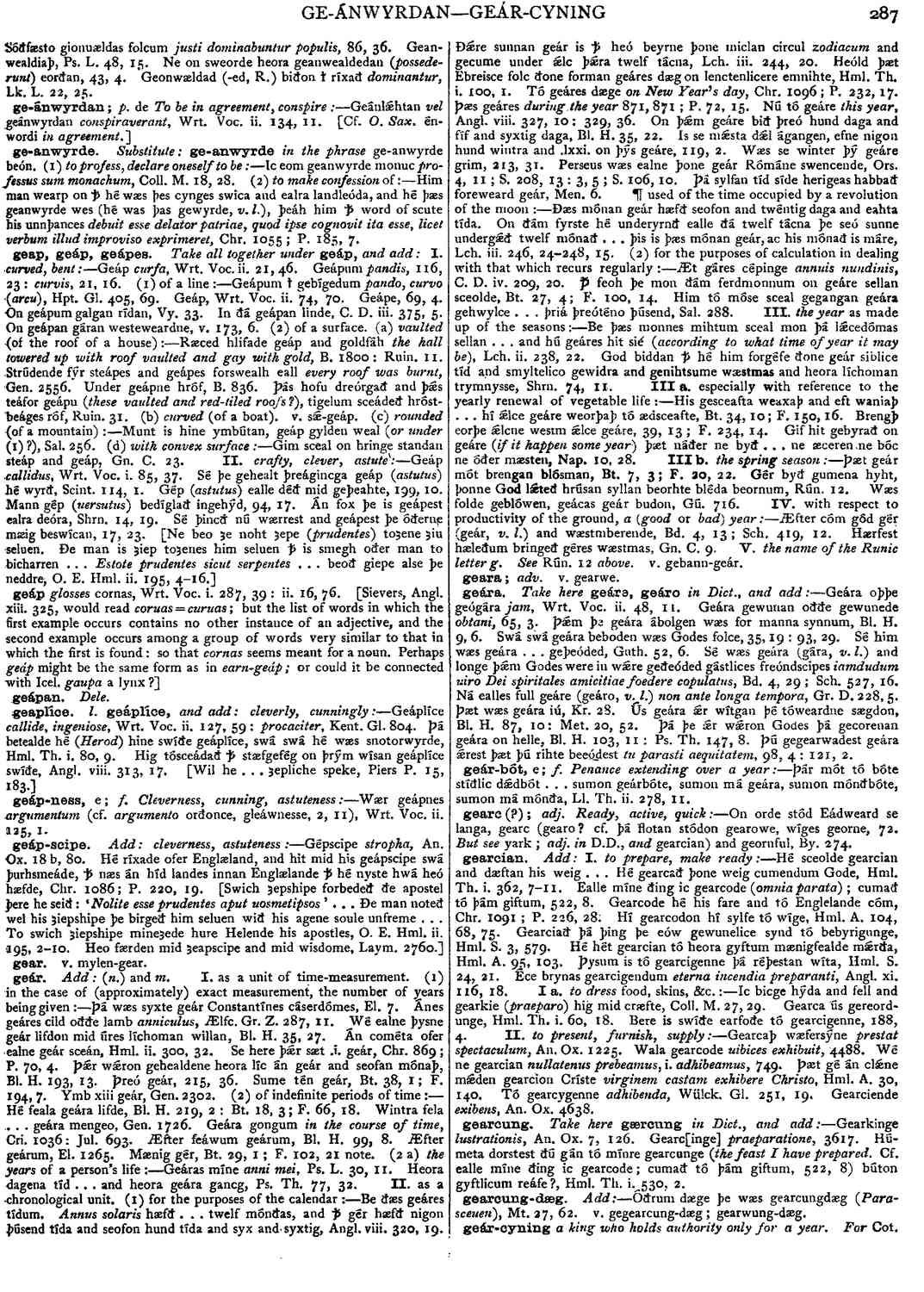geár
- noun [ masculineneuter ]
-
Þá wæs syxte geár Constantínes cáserdómes,
- El. 7.
-
Ánes geáres cild oððe lamb
anniculus
,- Ælfc. Gr. Z. 287, 11.
-
Wé ealne þysne geár lifdon mid úres líchoman willan,
- Bl. H. 35, 37.
-
Án cométa ofer ealne geár sceán,
- Hml. ii. 300, 32.
-
Se here þǽr sæt .i. geár,
- Chr. 869; P. 70, 4.
-
Þǽr wǽron gehealdene heora líc án geár and seofan mónaþ,
- Bl. H. 193, 13.
-
Þreó geár,
- 215, 36.
-
Sume tén geár,
- Bt. 38, 1; F. 194, 7.
-
Ymb xiii geár,
- Gen. 2302.
-
Hé feala geára lifde,
- Bl. H. 219, 2 : Bt. 18, 3; F. 66, 18.
- Wintra fela . . . geára mengeo. Gen. 1726.
-
Geára gongum
in the course of time
,- Cri. 1036: Jul. 693.
-
Æfter feáwum geárum,
- Bl. H. 99, 8.
-
Æfter geárum,
- El. 1265.
-
Mænig gér, Bt. 29, l; F. 102, 21 note. (2 a) the years of a person's life :-- Geáras míne
anni mei
,- Ps. L. 30, II.
-
Be ðæs geáres tídum.
Annus Solaris
hæfð . . . twelf mónðas, and ꝥ gér hæfð nigon þúsend tída and seofon hund tída and syx and syxtig,- Angl. viii. 320, 19.
-
Ðǽre sunnan geár is ꝥ heó beyrne þone miclan circul
zodiacum
and gecume under ǽlc þǽra twelf tácna,- Lch. iii. 244, 20.
-
Heóld þæt Ebreisce folc ðone forman geáres dægon lenctenlicere emnihte, Hml. Th. i. 100, I. Tó geáres dæge
on New Year's day
,- Chr. 1096 ; P. 232, 17.
-
Þæs geáres
during the year
- 871, 871 ; P. 72, 15.
-
Nú tó geáre
this year
,- Angl. viii. 327, 10: 329, 36.
- On þǽm geáre bið þreó hund daga and fíf and syxtig daga. Bl. H. 35, 22.
-
Is se mǽsta dǽl ágangen, efne nigon hund wintra and .lxxi. on þýs geáre,
- 119, 2.
-
Wæs se winter þý geáre grim,
- 213, 31.
-
Perseus wæs ealne þone geár Rómáne swencende,
- Ors. 4, ll; S. 208, 13 : 3, 5 ; S. 106, 10.
-
Þá sylfan tíd síde herigeas habbað foreweard geár. Men. 6. ¶ used of the time occupied by a revolution of the moon :-- Ðæs mónan geár hæfð seofon and twéntig daga and eahta tída. On ðám fyrste hé underyrnð ealle ðá twelf tácna þe seó sunne undergǽð twelf mónað . . . þis is þæs mónan geár, ac his mónað is máre,
- Lch. iii. 246, 24-248, 15.
-
Æt gáres cépinge
annuis nundinis
,- C. D. iv. 209, 20. ꝥ
- Him tó móse sceal gegangan geára gehwylce . . . þriá þreóténo þúsend. Sal. 288.
-
Be þæs monnes mihtum sceal mon þá lǽcedómas sellan . . . and hú geáres hit sié (
according to what time of year it may be
),- Lch. ii. 238, 22.
-
God biddan ꝥ hé him forgéfe ðone geár siblice tíd and smyltelico gewidra and genihtsume wæstmas and heora líchoman trymnysse,
- Shrn. 74, n. III a.
-
Brengþ eorþe ǽlcne westm ǽlce geáre,
- 39, 13 ; F. 234, 14.
-
Gif hit gebyrað on geáre (if it happen some year) þæt náðer ne byð . . . ne æceren , ne bóc ne oðer mæsten, Nap. 10, 28. III b.
the spring season
:-- Þæt geár mót brengan blósman,- Bt. 7, 3; F. 20, 22.
-
Gér byð gumena hyht, þonne God lǽteð hrúsan syllan beorhte bléda beornum,
- Rún. 12.
-
Wæs folde geblówen, geácas geár budon,
- Gú. 716.
-
Æfter cóm gód gér (geár,
v. l.
) and wæstmberende,- Bd. 4, 13 ; Sch. 419, 12.
-
Hærfest hæleðum bringeð géres wæstmas,
- Gn. C. 9.
Bosworth, Joseph. “geár.” In An Anglo-Saxon Dictionary Online, edited by Thomas Northcote Toller, Christ Sean, and Ondřej Tichy. Prague: Faculty of Arts, Charles University, 2014. https://bosworthtoller.com/47078.
Checked: 0